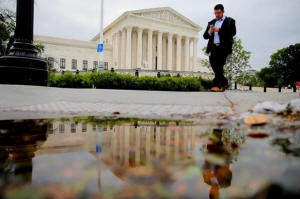|
Divided U.S. Supreme Court turns to less
sensitive IP cases
 Send a link to a friend
Send a link to a friend
 [September 21, 2016]
By Lawrence Hurley [September 21, 2016]
By Lawrence Hurley
WASHINGTON (Reuters) - Shorthanded and
ideologically divided, the U.S. Supreme Court has yet to take up any
cases on politically sensitive social issues in its new term starting in
October, instead showing a keen interest in more technical cases of
importance to business such as disputes over intellectual property.
In addition to four intellectual property cases it has already agreed to
hear, the court could as soon as next week take up a trademark battle
that pits an Asian-American rock band and the Washington Redskins
football team against the U.S. Patent and Trademark Office.
Later in the year, the court could take up a quirky copyright fight
between a woman and a record company over a video she posted online of
her toddler son dancing to a Prince song.
The lineup so far is in contrast to the court's last term, in which it
heard major cases on abortion, racial preferences and immigration in
which it was closely divided. Those cases were taken up before the death
of conservative Antonin Scalia in February, which left what is usually a
nine-member court with a vacancy that shows no sign of being filled
until next year due to the Republican-controlled Senate's refusal to
consider President Barack Obama's nominee.

Although the court has not taken up any cases of such social or
political magnitude for the coming term, it's possible it could do so
before it ends in June. The battle over whether transgender students can
use bathrooms that match their gender identity is one candidate.
It is not unusual for the court to take up a handful of intellectual
property (IP) cases among the 70 or so it selects for oral argument but
this year there is a greater incentive than ever because they are often
decided by unanimous or lopsided votes.
(Graphic on the Supreme Court's handling of intellectual property cases:
http://tmsnrt.rs/2cZmi4S)
Legal experts say the justices might seek to avoid cases on which they
could split 4-4. Such splits occurred four times after Scalia’s death,
and provide little legal clarity, as there’s no written decision and no
national precedent set.
“I do think the court will be looking for cases that don't break along
traditional partisan lines. IP cases fit that bill,” said Mark Lemley, a
law professor at Stanford Law School.
Such cases, on patent law, copyright and trademarks, can have high
financial stakes, especially when companies fight over lucrative patent
protections. One of the four IP cases already taken up include a $400
million patent dispute between Samsung Electronics Co Ltd <005930.KS>
and Apple Inc <AAPL.O> over the design of the iPhone, which will be
heard on Oct. 11.
"DANCING BABY" CASE
In the court’s last term, it heard three intellectual property cases,
with two decided 8-0 and one 7-1, in line with the vote counts in
similar cases in recent years.
The trend in recent years, at least in patent cases, is for the court to
frequently reverse appeals court rulings that are overly protective of
patent rights. There is less of a pattern in trademark and copyright
cases.
Some lawyers think the court may have lowered its standards for the
coming term, accepting cases that it can dispose of without 4-4 votes.
The court can take cases for various reasons, such as to resolve splits
between lower courts or to decide a question of pressing national
importance.
[to top of second column] |

A pedestrian walks in front of the U.S. Supreme Court building in
Washington, U.S., May 19, 2016. REUTERS/Carlos Barria

IP law experts cited one of the patent cases, a dispute over whether
genetic-testing kits made by biotechnology company Life Technologies
Corp, now part of Thermo Fisher Scientific Inc <TMO.N> infringed
upon patents held by Promega Corp as an example in part because the
issue is narrow and it has little chance of affecting other cases.
Charles Duan, a lawyer with digital advocacy group Public Knowledge,
was among those who questioned why the court took the Promega case,
saying it "doesn't have much of a direct impact on the public."
IP cases the court could still decide to hear this term include the
two disputes over whether offensive trademarks can be canceled.
The Slants rock band, whose members are Asian-American, chose the
name specifically to reclaim a term used to disparage Asians. But
its application for a trademark was rejected by the federal
trademark office.
In the other case, the Washington Redskins organization has long
trademarked its name and objected when the trademark office sought
to cancel it because it was deemed to disparage Native Americans.
The court will also decide whether to hear the copyright dispute
dubbed the “dancing baby” case over a video posted online that
showed a toddler dancing to Prince song “Let’s Go Crazy”.. The legal
question is whether copyright holders can face damages if they
incorrectly tell someone to take down content posted online that is
protected by the so-called “fair use” doctrine, which allows
unauthorized use of copyrighted material in some circumstances.
The court has also showed provisional interest in three other
intellectual property-related cases by asking the Obama
administration to file briefs offering its opinion on whether they
should be taken up.

One closely-watched case on that list concerns Novartis AG's<NOVN.S>
bid to launch a copycat version of Amgen Inc's<AMGN.O> cancer drug
Neupogen, which IP law experts say the court could take up because
it is the first to reach the high court on a new law addressing
so-called biosimilar drugs.
(Reporting by Lawrence Hurley; editing by Stuart Grudgings.)
[© 2016 Thomson Reuters. All rights
reserved.]
Copyright 2016 Reuters. All rights reserved. This material may not be published,
broadcast, rewritten or redistributed. |